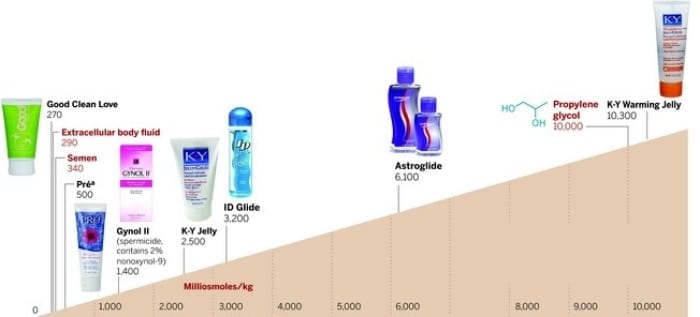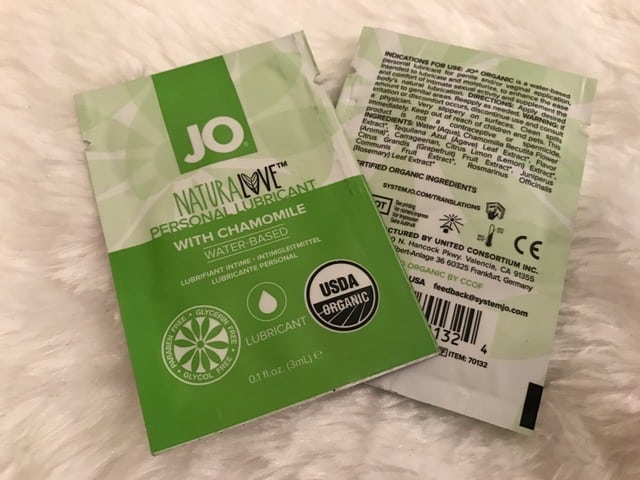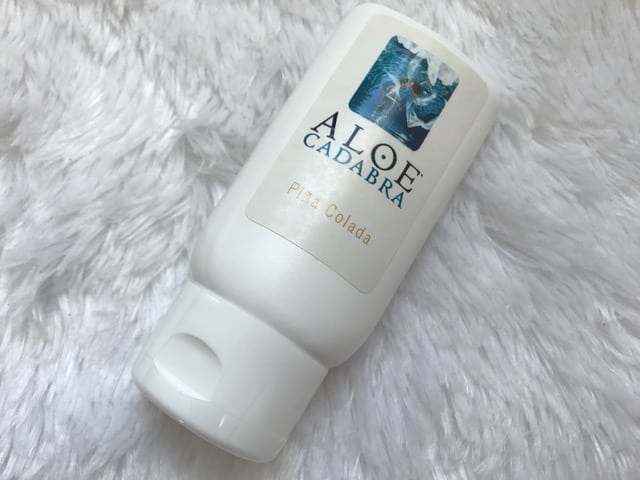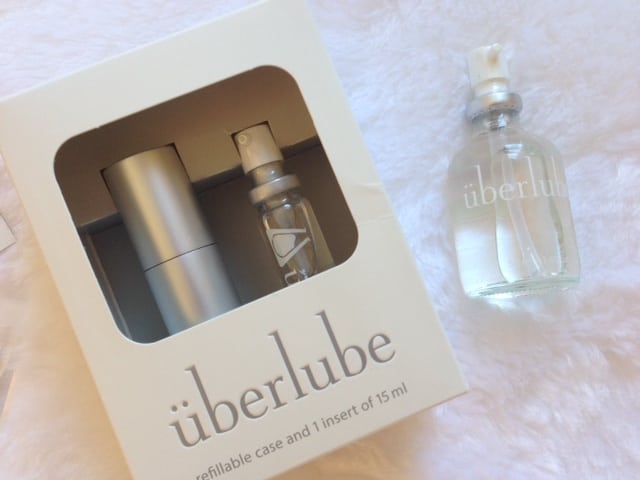Here we go, total disclosure. I have a really bad history with lube. I never needed lube until I went on daily 24-hour allergy medication – which dried much more than my sinuses, and left me and my vagina longing for the days where lubrication was easy and I got wet just by brushing past a hot guy at the bar. I used to be able to take the peen like it was a toddler on a slip and slide, but now, with my nether regions as dry as the Sahara (even after more than enough foreplay), I felt like Debbie Downer when I had to reach for a bottle of lube.
Pain During & After Sex… Even with Lube
First, I tried the stuff you buy over the counter. One by one, I cleared the shelves at CVS. KY Jelly felt like someone had literally squeezed strawberry jam out of a Smuckers bottle, turned it clear, and put it inside my vagina. WAY too sticky. Then, Astroglide… a little bit better (not as sticky or tacky) but it left me feeling itchy and burny. Then I tried Durex… all of them. The aloe version was a little better, but the rest left me uncomfortable. Forget about anything that had a tingling or warming sensation. My vagina was on fire and screaming.
But, I didn’t let bad lube get me down. I picked the least bad of all the evil lubes, and continued to have sex… occasionally trying a new one when a sample was thrown my way. After sex, I would usually be a bit itchy or burny for an hour… then maybe a few hours… then maybe a day or two, but I mostly attributed it to the sex being a little rough or my body just getting used to using lube. After a few months, something strange started to happen. Every time I had sex or used toys, I was in severe pain. It felt like my insides were on fire, or like I was being stabbed with a knife. It kept getting worse and worse. Eventually, I would have to stop having sex after just a few strokes. I was in tremendous pain, and I couldn’t continue. It was ruining my sex life, and I was afraid for my health.
Trying to Find Answers
I went to my gynecologist for my yearly pap smear (something every girl should get if she’s over 18 or sexually active). While there, I told her about all this horrible pain I was having during sex. She asked me all the normal questions… How many partners have you had? Are you having sex with one partner – or many? Do you think you might have an STD? Are you using lube? I have had a lot of partners, and even though I am always sure to take care of my personal health, it wasn’t outside of the realm of possibility that I might have an STD. So, she tested me for every STD in the book… all negative. She tested me for yeast infections, bacterial infections, urinary tract infections, and bladder infections… all negative. “We can’t find anything wrong. Maybe you’re just shy and nervous during sex, and your vagina is tensing up. We can send you to a sex therapist.” This vagina? SHY?! She obviously didn’t know who she was talking to. “If not, just keep using more lube,” she said… and she sent me home with a bottle of KY Jelly.
Well, I used the KY Jelly, and I was still seeing stars from pain. I cried all night that my own “expert” doctors couldn’t figure out what was causing me pain, and I mourned the proverbial death of my sex life. Then, my partner looked at the bottle of lube. He turned the bottle around, and read through the chemicals in KY. He’s a biochemist, and immediately recognized some of the chemicals as known skin irritants and toxic to animals. Of course, the properties of a chemical are very different when they’re watered down and mixed with other chemicals… but even so, he suspected that the very thing the doctor recommended to fix the problem, was actually what was causing my pain.
Learning About Toxic Chemicals
My partner started looking up the chemicals in the large collection of lubes I had acquired in my desperation. I would like to say I helped him, but I mainly just cried into my pillow at the thought of never having sex again – and that I might have permanently ruined my vagina. Trying to figure out what was going on wasn’t easy. There was hardly any information out there about the safety of lubricants, or the chemicals in them.
In fact, we soon found that lubricants don’t even need to be FDA approved in order to go on the market. Take a moment to digest that. Personal lubricants, which go inside our sensitive vaginas and assholes, are not even regulated by the FDA. In fact, it’s nearly impossible to find a list of personal lubricants that are FDA approved. Recently, since December 2013, the FDA has required that some lubricants get approval as a medical device, but it is not necessary for the majority of lubricants. It is mainly for lubricants that make claims about pregnancy safety and menopause – and are considered “medical” lubricants, rather than “sexual enhancers”. The rest of the lubricants can still be sold in stores without any approval or regulation at all.
Even with approval, the FDA allows a myriad of harmful chemicals to be in lube. The two main chemicals known to cause problems are Parabens and Glycerine & Glycols.
Parabens
Parabens are most often seen as methylparaben, propylparaben, and butylparaben. There are a few huge reasons why they should be avoided. First, parabens mimic estrogen and have been found in breast cancer tumors. The connection is so strong that experts believe parabens found in our cosmetics and personal products may be linked to caner. Parabens have also been linked to reduced sperm count, testicular cancer, and ovarian cancer. They are also known to sensitize the skin and create an allergic response, causing immediate pain, itching, and burning. With so many terrible consequences of parabens, why even bother to include them in lubricants?! Even more – lubricants go directly on your most sensitive tissues, which have very thin cellular walls… essentially giving a direct blood route to cause you problems.
Glycerine & Glycols
Glycerine is similar to a sugar, and is linked to yeast infections and causing damage in mucus membranes (like the vagina). Glycols, most notably Propylene Glycol, is found in brake fluid, anti-freeze, and paint solvents. It is an irritant to the eyes and skin, and is known to cause visible damage to skin and health. Polyethylene Glycol strips the skin’s natural moisture, is an eye and skin irritant, a possible carcinogen and can produce severe acidosis, central nervous system damage and congestion.
Other Chemicals
Nonoxynol-9, found in many contraceptive lubricants that contain the spermicide, literally punches holes in your cells and destroys them. It effectively causes tissue damage on your most sensitive vaginal skin. Synthetic menthol and natural Peppermint Oil can be irritating, drying, and cause damage to mucus membranes. Petrochemicals, most often found in oil based lubes, prevent the vagina’s ability to “flush” itself, leaving you open to bacterial or other infections. They are also linked to cancer, so much so that they are no longer allowed in cosmetics. Fragrances are incredibly toxic, with a toxicity rating of 8 out of 10 (extremely high) in the Cosmetic Database. They contain phthalates, cancer-causing chemicals found in jelly sex toys, and other poisonous chemicals. Fragrances have been associated with allergies, dermatitis, respiratory distress and potential effects on the reproductive system, as per Cosmetic Database. Other lubricants are so heavy that they literally squeeze your cells to death.

Lubricants shown from least heavy to most heavy (crushing cells).
Why did my gynecologist send me home with a bottle of KY – and use exclusively KY in her office – when it is one of the most dangerous lubricants for a woman’s personal health? It’s safe to say that I have already switched to another doctor.
Finding a Solution
I would like to say that it’s as easy as switching to another lubricant – but it’s not. Organic lubricants do not have the same cell-destroying chemicals as many over the counter lubricants – but unfortunately, their natural ingredients are not FDA approved either. Some people may argue that you have just as much of a risk, if not more, of harming your body with natural lubricants, as the chemicals are not regulated. There is another school of thought that believes natural products are better for your body because your body has evolved along with nature. But for me, I virtually had no choice. I either forfeit my sex life, use over the counter lubricants that were hurting my body and leaving me in severe pain… or I take a chance with some natural lubricants that are 100% free of the chemicals known to be toxic. I took that chance, and from the moment I used organic lubes, I knew I had made the right decision for my body and my sex life.
Wicked Lubricant scored 5 Stars with us. Get it at GoodVibes!

Organic Lubricants
Sliquid (check them out here), Yes, Aloe Cadabra, and Good Clean Love (we love their Almost Naked lube) are the top manufacturers of natural, organic lubricants. Personally, I love Good Clean Love – so much that I asked their founder to educate our readers on the harmful chemicals in lubricants. They have since written other awesome posts for our audience, and I’ll be reviewing a few of their favorite products. Although I haven’t tried the other brands, Good Clean Love recommends both Yes and Aloe Cadabra – and one of my favorite reviewers swears by Sliquid.
Wicked is another one of our favorite lubricants. Buy it here!
Astroglide makes a glycerin and paraben free lubricant – but they market it for women who have “hypersensitivities” to lubricants, which I entirely disagree with. The painful and dangerous effects of toxic chemicals in lube DO NOT reflect a small percent of ladies who “struggle with hypersensitivies”. Toxic and cancerous chemicals are a widespread public health issue that affects ALL women, whether they are experience symptoms or not. Astroglide’s statement about hypersensitivities marginalizes women who experience pain, and says “it’s not a problem with our chemicals, it’s a problem with YOU.” I suggest you do not buy from Astroglide.
When it comes to choosing the right lube for you, it’s important to explore your options. Everyone’s body is different – and you may find that my favorite lube isn’t quite right for you. Most lube companies offer small sample packets for a very low price (around a dollar or two) so you can try it out and see if it’s right for you before buying a whole bottle. For me, I’m so thankful I learned about the harmful chemicals in lube that were causing me pain – and that I’ve now switched to natural, organic alternatives. It’s a relief to know that I can finally have sex without a burning, itching, painful sensation that lingered days after – or at it’s worse, had me seeing stars and stopping sex in its tracks.





